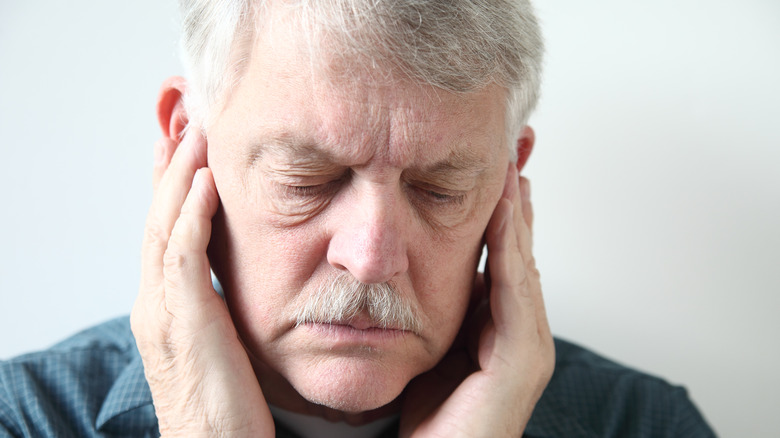What Does It Feel Like If You Have TMJ Ear Pain?
You may have heard the term "TMJ” referred to as a disorder of the jaw, yet TMJ actually stands for the body part itself, rather than the associated disorder, explains Lowcountry Family Dentistry. Located on each side of our face, our temporomandibular joints fasten our jaw to our skull and aid in our ability to speak and chew. While causes of the disorder can vary, teeth grinding, arthritis, as well as certain health conditions, can all increase one's likelihood of developing a TMJ disorder (via Mayo Clinic).
Often characterized by symptoms of jaw pain, chewing difficulty, and locking of the jaw that may limit one's range of motion, there is one lesser known symptom associated with TMJ disorders — ear pain. While you may not see a clear connection between the two at first glance, experts at Portland Physical Therapy explain that our temporomandibular joint sits in close proximity to our ear muscles. Misalignment, damage, or injury to the joint can, therefore, place pressure on the surrounding ear muscles, including the nerves, thus leading to ear pain.
How to relieve ear pain from TMJ disorders
Ear pain from a TMJ disorder can take many forms. For some, it may be a sharp, shooting pain, while others may experience a dull ache, fullness, ringing, or other noises (via eMedicineHealth). Ear pain may even strike when the jaw is in motion, such as when talking or chewing.
Depending on the cause of your TMJ disorder, different treatment methods can be used to help relieve related ear pain. Dr. Ivan Stein advises via the Headache & TMJ Center of New Jersey to steer clear of hard, crunchy food items, as these can aggravate TMJ-related ear pain. The same goes for chewy items such as gum. Instead, opt for softer foods that won't be quite as taxing for your jaw.
Alternatively, jaw exercises such as chin tucks, opening and closing your mouth, as well as moving your jaw left, right, and forward can all help build jaw strength. Conversely, relaxation exercises can help reduce tension in the jaw. Even small adjustments can make a big difference. These include refraining from biting your nails or lower lip, maintaining good posture, as well as letting your mouth fall partly open throughout the day. Doing so will stop your upper and lower teeth from touching and prevent clenching. In more severe cases, consider consulting with your dentist or doctor. They may suggest a custom-fit night guard mouthpiece or possible surgery (per Exceptional Dental).


